Country visits reports
Following an official invitation by the Member States, an ECDC team conducts visits and meetings to discuss AMR issues in the country with the overall objective of providing an evidence-based assessment of the situation regarding prevention and control of AMR through prudent use of antibiotics and infection control. The page shows the ECDC country visit reports.
Belgium
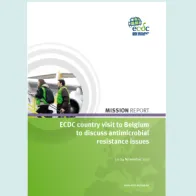
An ECDC country visit team conducted an assessment mission on 20-24 November 2017 to discuss antimicrobial resistance (AMR) issues in Belgium with the overall objective to provide an observation-based assessment of the situation in Belgium regarding prevention and control of AMR through prudent use of antibiotics and infection control.
ECDC country visit to Belgium to discuss antimicrobial resistance issues
English (652.99 KB - PDF)Bulgaria
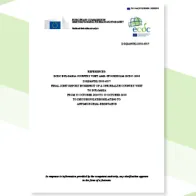
ECDC and the European Commission's Directorate General for Health and Food Safety jointly carried out this country visit to Bulgaria from 15 to 19 October 2018. The visit was carried out following the invitation from the competent authorities to assist them in the preparation of their national strategy for tackling antimicrobial resistance (AMR) based on a 'One Health' perspective.
Country visit to Bulgaria to discuss policies relating to antimicrobial resistance
English (572.87 KB - PDF)Estonia
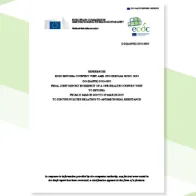
The European Centre for Disease Prevention and Control (ECDC) and the European Commission's Directorate General for Health and Food Safety jointly carried out this country visit to Estonia from 25 to 29 March 2019. The visit was carried out following the invitation from the competent authorities to assist them in the preparation of their national strategy for tackling antimicrobial resistance (AMR) based on a 'One Health' perspective.
ECDC and European Commission country visit to Estonia to discuss policies relating to antimicrobial resistance
English (653.11 KB - PDF)Greece
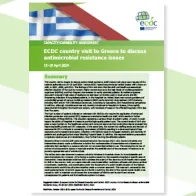
This country visit to Greece to discuss antimicrobial resistance (AMR) issues took place upon request of the national authorities on 15–19 April 2024.
ECDC country visit to Greece to discuss antimicrobial resistance issues
English (332.79 KB - PDF)Ireland

ECDC and the European Commission's Directorate General for Health and Food Safety jointly carried out this country visit to Ireland from 7 to 11 October 2019. The visit was carried out following the invitation from the competent authorities to assist them in the development and implementation of their national strategy for tackling antimicrobial resistance (AMR) based on a 'One Health' approach.
Final joint report in respect of a one health country visit to Ireland from 07 October 2019 to 11 October 2019 to discuss policies relating to antimicrobial resistance
English (779.1 KB - PDF)Italy
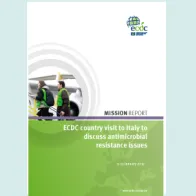
An ECDC team conducted visits and meetings to Italy on 9-13 January 2017 to specifically discuss and assess the situation in the country regarding prevention and control of AMR. Observations from this ECDC country visit confirm that the AMR situation in Italian hospitals and regions poses a major public health threat to the country. If the current trends of carbapenem resistance and colistin resistance in gram-negative bacteria such as Klebsiella pneumoniae and A. baumannii are not reversed, key medical interventions will be compromised in the near future.
ECDC country visit to Italy to discuss antimicrobial resistance issues
English (573.62 KB - PDF)Kosovo
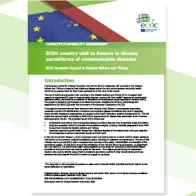
ECDC conducted a technical visit to Kosovo in March 2025 to obtain additional information on the country’s national surveillance system.
Kosovo report on country visit to discuss surveillance communicable diseases
English (308.4 KB - PDF)Latvia
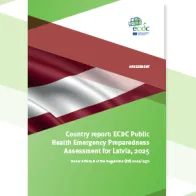
ECDC has the responsibility, in coordination with relevant Union agencies and bodies, to conduct Public Health Emergency Preparedness Assessments of all EU/EEA countries every three years regarding the state of implementation of their national prevention, preparedness and response planning.
Country report: ECDC Public Health Emergency Preparedness Assessment for Latvia, 2025
English (1.06 MB - PDF)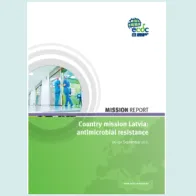
As part of an ECDC country visit to Latvia on 26–30 September 2011, an ECDC team conducted visits and meetings to discuss AMR issues in Latvia and provide an assessment. Compared with many other EU countries, the present AMR situation of Latvia is favourable. There is an infection control legislation that is under implementation and the legislation is a good basis for improving infection control practices.
ECDC country visit to Latvia to discuss antimicrobial resistance issues
English (1.64 MB - PDF)Luxembourg
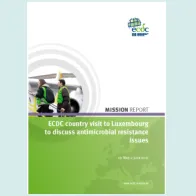
An ECDC team conducted visits and meetings to the country on 29 May - 2 June 2017, with the objective of providing an evidence-based assessment of the situation. Antibiotic consumption in Luxembourg is at the EU average in hospitals, but higher than the EU average in the community. The AMR levels in bacterial isolates from humans are at or below the EU average.
ECDC country visit to Luxembourg to discuss antimicrobial resistance issues
English (794.24 KB - PDF)Malta
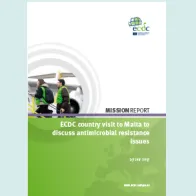
The ECDC and the European Commission's Directorate-General for Health and Food Safety, at the invitation of the Maltese authorities, jointly carried out a country visit from 3 to 7 July 2017. The overall aim of the visit was to assist them in the further development and implementation of their national policies and strategies for tackling antimicrobial resistance based on a One Health perspective.
ECDC country visit to Malta to discuss antimicrobial resistance issues, 3-7 July 2017
English (756.97 KB - PDF)Norway
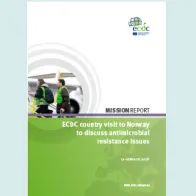
An ECDC country visit team conducted an assessment mission during the period 12–16 March 2018 to discuss antimicrobial resistance (AMR) issues in Norway. The overall objective of the mission was to provide an observation-based assessment of the situation in Norway regarding prevention and control of AMR through prudent use of antibiotics and infection control.
ECDC country visit to Norway to discuss antimicrobial resistance issues
English (702.82 KB - PDF)North Macedonia
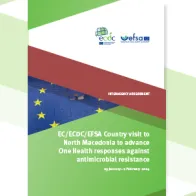
The European Centre for Disease Prevention and Control (ECDC), the European Commission’s Directorate-General for Health and Food Safety and the European Food Safety Authority (EFSA) jointly carried out this country visit to North Macedonia from 29 January to 2 February 2024, which was coordinated by a consortium composed of
Epiconcept and Integrated Quality Laboratory Services.
Country visit to North Macedonia to advance One Health responses against AMR
English (1.15 MB - PDF)Romania
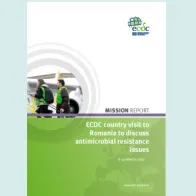
An ECDC team conducted visits and meetings to discuss AMR issues in Romania with the overall objective of providing an evidence-based assessment of the situation in Romania regarding prevention and control of AMR through prudent use of antibiotics and infection control.
ECDC country visit to Romania to discuss antimicrobial resistance issues
English (682.93 KB - PDF)Spain
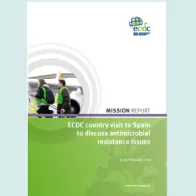
On 15-19 February 2016 an ECDC team conducted visits and meetings to discuss AMR issues in Spain, with the overall objective of providing an evidence-based assessment of the situation in Spain. The AMR situation in Spain poses a major public health threat to the country. Antimicrobial consumption in primary care and hospitals is among the highest in the EU/EEA and infection prevention and control and environmental cleaning measures vary significantly among hospitals and units.
ECDC country visit to Spain to discuss antimicrobial resistance issues
English (582.29 KB - PDF)Sweden

ECDC and DG SANTE jointly carried out this country visit to Sweden from 16 to 20 September 2024 to assist in the review of their national strategy and plan for tackling antimicrobial resistance (AMR), based on a One Health approach.
Country visit to Sweden to discuss antimicrobial resistance issues based on a One Health approach
English (1.04 MB - PDF)